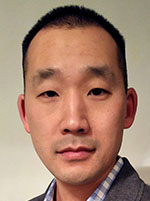 |
| UPenn's Edmund Moon |
CAR-T drugs have already demonstrated significant promise in human blood cancer studies, but clearly face a big challenge in making the leap into solid tumors, which would greatly increase the technology's market potential.
To help overcome the obstacle, scientists closely allied with the leading companies in the field have been working on second-gen strategies. And Dr. Edmund Moon, an assistant professor of medicine at the University of Pennsylvania (allied to Novartis), says he has successfully completed a preclinical study that could help blaze a trail forward.
Moon focused on PD-1, a key checkpoint inhibitory receptor that is targeted by two recently approved therapeutics, pembrolizumab and nivolumab, which appear to have limited efficacy in some tumors due to a low count of "tumor-reactive immune cells" needed to mount a successful counterattack against cancer.
So Moon and his team engineered a next-gen immune cell, inserting a genetically engineered switch receptor, PD1CD28, into the CAR-T cells using a viral vector that has become popular in gene therapy circles. These cells targeted three key proteins--CD19, mesothelin, or PSCA--found on the cancer cells. And they engineered it with a part of PD-1 that recognizes its counterpart PD-L1 on tumor cells with a portion of CD28 that signals an immune response.
Studying their switch receptor CAR-T with the original CAR-T, which adds a chimeric antigen receptor to T cells to rev up an immune system attack, they found that the new-and-improved tech outperformed the first-gen model in mice.
"Some of the tumors we tested are very aggressive and resistant to other forms of therapy. We were surprised to see that the PD1CD28 CAR T cells led to a strong response and increased survival in many mice bearing such tumors as compared with CAR T cells without the switch receptor. We were also surprised to see that other forms of genetically engineered PD-1-based receptors did not have any enhancing effects on the CAR T cells. In fact, in some experiments, they did worse than the regular CAR T cells," Moon said. "We are hopeful that the great success seen with investigational CAR T-cell therapy in blood tumors will occur in solid tumors as well, as we continue to study ways to combine other immunotherapies with T-cell therapy, and better understand ways to augment T-cell function in solid tumors."
- here's the release